
Relationship and connectedness are the pre-condition for change. Every meeting, every process, every training program has to get people connected first. Otherwise, the content falls on deaf ears. So small groups are an essential building block to any future you want to create. | Peter Block Continue reading Relationship and Connectedness Are the Pre-condition for Change Peter Block

Abstract The aggregation of many independent estimates can outperform the most accurate individual judgment. This centenarian finding, popularly known as the ‘wisdom of crowds’, has been applied to problems ranging from the diagnosis of cancer to financial forecasting. It is widely believed that social influence undermines collective wisdom by reducing the diversity of opinions within … Continue reading Aggregated Knowledge From a Small Number of Debates Outperforms the Wisdom of Large Crowds Joaquin Navajas, Tamara Niella, Gerry Garbulsky, Bahador Bahrami and Mariano Sigman (December 2018)

video player How can groups make good decisions? | Mariano Sigman and Dan Ariely Mariano closes this talk with the . You can read the transcript below. Partial Transcript Good collective decisions require two components: deliberation and diversity of opinions. Right now, the way we typically make our voice heard in many societies is through … Continue reading How Can Groups Make Good Decisions? Mariano Sigman and Dan Ariely (2017)

Abstract Current models draw a broad distinction between communication as dialogue and communication as monologue. The two kinds of models have different implications for who influences whom in a group discussion. If the discussion is like interactive dialogue, group members should be influenced most by those with whom they interact in the discussion; if it … Continue reading Group Discussion as Interactive Dialogue or as Serial Monologue: the Influence of Group Size Nicolas Fay, Simon Garrod and Jean Carletta (2000)

Despite current ads and slogans, the world doesn’t change one person at a time. It changes when networks of relationships form among people who share a common cause and vision of what’s possible. This is good news for those of us intent on creating a positive future. Rather than worry about critical mass, our work is to foster critical … | Meg Wheatley Continue reading The World Doesn’t Change One Person at a Time Meg Wheatley

Never doubt that a small group of thoughtful, committed citizens can change the world; indeed, it’s the only thing that ever has. | Margaret Mead Continue reading A Small Group of Thoughtful, Committed Citizens Can Change the World Margaret Mead

Free group discussion is to thinking (ideas and abstractions) as handling things is to perception. | Melanie Abercrombie Continue reading Abercrombie’s Thesis Melanie Abercrombie
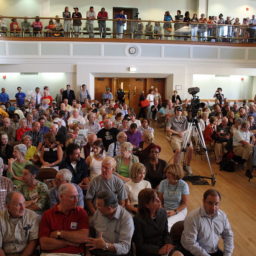
Voting in a Democracy ** Freedom of Speech Close Pop-up all posts in this chapter What’s the Vibe? Please be patient as this may take up to a minute to load… Close Citizens, Assemble! Deliberative Democracy in 3 Minutes What is Deliberative Democracy? When Citizens Assemble Posts that link to this post The Argumentative Theory of … Continue reading Deliberative Democracy ** Deliberation is central to decision-making

Wisdom of Crowds of Crowds What Is the Optimum Group Size for a Conversation? Close Pop-up all posts in this chapter What’s the Vibe? Please be patient as this may take up to a minute to load… Close Small group conversations are at the heart of Conversational Leadership, but there are several challenges to be … Continue reading Introduction: Small Group Conversations Small groups are an essential building block to any future you want to create
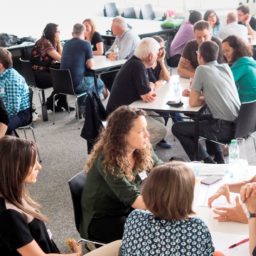
Introduction: Small Group Conversations Groupthink Close Pop-up all posts in this chapter What’s the Vibe? Please be patient as this may take up to a minute to load… Close Deciding the optimum group size for a conversation or decision-making is critical in small group work. What is the optimum size? Over the years, in running … Continue reading What Is the Optimum Group Size for a Conversation? More than five people and it is not a conversation

Data from various settings suggest that there is an upper limit of about four on the number of individuals who can interact in spontaneous conversation. Abstract Data from various settings suggest that there is an upper limit of about four on the number of individuals who can interact in spontaneous conversation. This limit appears to … Continue reading Size and Structure of Freely Forming Conversational Groups Robin Dunbar, N. D. C. Duncan and D. Nettle (1995)

Introduction: Knowledge Café Principles Knowledge Café Principle: Everyone Has an Equal Voice Close Pop-up all posts in this chapter What’s the Vibe? Please be patient as this may take up to a minute to load… Close Principle: Conversation is Sovereign. The Knowledge Café aims to facilitate meaningful conversations. To do this, it is important to … Continue reading Knowledge Café Principle: Conversation Is Sovereign It’s all about the conversation

Knowledge Café Principle: Conversation Is Sovereign Knowledge Café Principle: Create a Safe Space Close Pop-up all posts in this chapter What’s the Vibe? Please be patient as this may take up to a minute to load… Close Principle: Everyone has an equal voice. In a Knowledge Café, all participants are treated equally. No one is … Continue reading Knowledge Café Principle: Everyone Has an Equal Voice Everyone is an equal participant


Knowledge Café Principle: Preserve the Flow Knowledge Café Principle: Dialogue Not Debate Close Pop-up all posts in this chapter What’s the Vibe? Please be patient as this may take up to a minute to load… Close Principle: Engage in small groups. At the heart of the Knowledge Café are small group conversations. These groups should … Continue reading Knowledge Café Principle: Engage in Small Groups Real conversation takes place in small groups

Connecting Minds Hard Conversation Close Pop-up all posts in this chapter What’s the Vibe? Please be patient as this may take up to a minute to load… Close There are two conversations. The face-to-face external conversations we have with other people. And the silent internal conversations or inner conversations we have with ourselves, in our heads. Thinking … Continue reading Thinking Together Talking with each other beats talking to ourselves

Knowledge Café: Choosing the Room Knowledge Café: Cafés with No Tables Close Pop-up all posts in this chapter What’s the Vibe? Please be patient as this may take up to a minute to load… Close Selecting suitable tables for a Knowledge Café is one of the most critical factors in the success of the Café. … Continue reading Knowledge Café: Choosing the Tables Small round tables are best that sit 3 or 4 are best
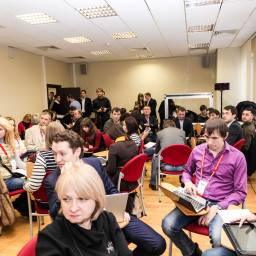
Knowledge Café: Choosing the Tables Knowledge Café: Laying Out the Room Close Pop-up all posts in this chapter What’s the Vibe? Please be patient as this may take up to a minute to load… Close Sometimes, when running a Knowledge Café, if the room is too small and the number of participants large, it is … Continue reading Knowledge Café: Cafés with No Tables Small tables are better than no tables

Social Silencing Wisdom of Crowds of Crowds Close Pop-up all posts in this chapter What’s the Vibe? Please be patient as this may take up to a minute to load… Close Create psychological safety: Ensure people are safe for interpersonal risk-taking. Psychological safety refers to the sense of confidence and trust that individuals feel in … Continue reading Psychological Safety ** A shared belief that within your team it is safe to take risks
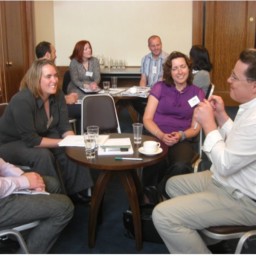
Knowledge Café: Posing the Question Knowledge Café: Large Group Design ** Close Pop-up all posts in this chapter What’s the Vibe? Please be patient as this may take up to a minute to load… Close Over the years, in running my Knowledge Cafés, I have discovered through experimentation and observation that the ideal group size … Continue reading Knowledge Café: Small Group Design The ideal small group size is three or four
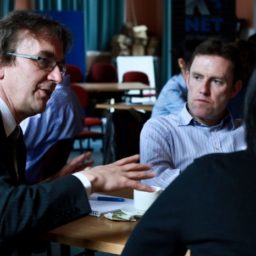
Knowledge Café: Table Hosts Knowledge Café: Moving Between Groups Close Pop-up all posts in this chapter What’s the Vibe? Please be patient as this may take up to a minute to load… Close In the Knowledge Café, the essence of the small group conversations is to get as close to a natural conversation as possible … Continue reading Knowledge Café: Small Group Conversations The small group conversations are the heart of the Café
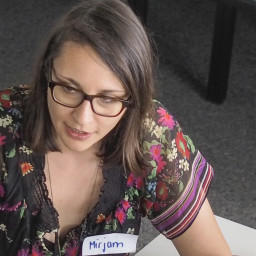
Knowledge Café: Small Group Conversations Knowledge Café: Circle Conversation Close Pop-up all posts in this chapter What’s the Vibe? Please be patient as this may take up to a minute to load… Close As part of the Knowledge Café process, people are asked to move between tables in small group conversations. This need not be … Continue reading Knowledge Café: Moving Between Groups Don’t complicate it

Psychological Safety ** Introduction: Small Group Conversations Close Pop-up all posts in this chapter What’s the Vibe? Please be patient as this may take up to a minute to load… Close The wisdom of crowds is the concept that large groups of people are collectively smarter than individuals regarding problem-solving, decision-making, and predicting. However, the … Continue reading Wisdom of Crowds of Crowds Crowds within a crowd outperform ‘wisdom of the crowd’















